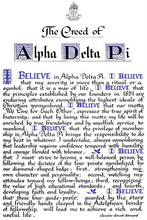First... Characteristics of the Leaders I would move across country to work with:
a) Marc Adams - Marc was my district director when I first worked for JCPenney - he taught me a lot about working, retail and integrity. Later, we worked together again at Eddie Bauer (randomly).
The characteristics that I remember admiring about Marc, and which would make me willing to move across the country to work with him are: honest, caring, fun, knowledgable, humble, respected, fair but tough.
b) Julie Harris-Cheney - Julie was my director at Eddie Bauer and later in my time there I reported to her directly. It was a blast to work for Julie and we also had great opportunity to talk about spiritual matters (she is Jewish). I appreciated her willingness to listen and share and ask honest questions, in addition to these other characteristics: tough, expects excellence, loves people, respects others, fun, knowledgable, open, stubborn, smart
c) Scott Kessler - Scotty is the former head football coach at Greenville College... I actually DID move across country to work with him. He was a tough boss and a hard worker, but I learned so much from partnering with him in ministry and working with him in the football program. Characteristics of Scotty are: honest, visionary, Godly, wise, risk-taker, caring, respectful, interested.
When I think about leaders I want to follow (and thus, who I want to be), I think of these three people (among a few others) and their characteristics. I think about honesty and openness, respectful-ness of other's views, wise and knowledgable individuals, intelligent but also fun. I also know that while I love working for Christians, I think a person could be a good leader without being one - my mom always says that Christian principles work for everyone, so if a person led using Christian characteristics, I know that I would follow them. Granted, of course, I would prefer to follow someone who I believe is seeking God for the direction of our endeavor, and relying on God's gifts for their abilities - but frankly... I know some who call themselves Christians who may not reflect those things so....
OK, second, servant leadership. Working with Line Camp this week has offered me great opportunity to observe leadership first hand - in the person of its main full-time leaders and in the student leaders.
At check in we realized there was an error on the website, telling students the correct name of the check-in location... but not the right building number on the map. When it was pointed out, Matt tried to correct it on the web, but the server was down. So he decided to go out to the street and flag people down. I asked him why not send a Baylor Bound leader so that he could be at the Heritage House in case other stuff came up (he seemed like a pretty important dude to the process). He said that he would go, and I was left to ponder Servant Leadership. In situations like these, what is the best thing to do? I appreciated Matt's trust of all of us that we could handle it, and I think symbolically it said a lot that he left us there to handle it, and that he went and did this very hot job on his own. I think that I would have sent someone to go do it (or had them rotate) - not because I wouldn't have wanted to - I don't think I would have minded had I been in Matt's place - but because I like to be in the hub in case people have questions or need direction. I was grateful for Matt's example of trust and empowerment in this case, as it gave me a lot to think about. He certainly didn't abandon his post - he came back periodically to check on people and give us encouragement, but then he was gone again - and everything went smoothly.
Later in the week, Matt was very intentional about giving positive feedback to the small group leaders for the work they had done. He was sincere and grateful and I think it made an impact on the group. I've appreciated his enthusiasm, his passion for Line Camp and his ability to convey gratitude.
Third, So what... Now what....?
This is the hardest part of the journal for me this week. In my written journal I wrote: What will I do with all this info I have learned?
I wrote two answers so far:
a) I want to make informed decisions about how I currently lead and what kind of leader I want to be - are they the same?
What kind of leader do I aspire to be?:
thoughtful, honest, visionary, servant, humble, wise, Godly, knowledgable, interested, respectful, listening, sharing openly, prayerful, fun and passionate (probably among other things).
What kind of leader am I?:
sometimes controlling, not always adaptable, respectful, listening, hopefully Godly, hopefully interested, fun most of the time, passionate, generally thoughtful though sometimes too quick to act.
Perhaps if I keep my "aspirations" in front of me, that combined with my philosophy of ministry will keep me headed in the right direction.
b) I guess I need to think about how I would rank on some of those scales and see if they are where I want to be. Most of the scales we looked at would place "good" management at places that are both task and people oriented (somehow). But good management varies depending on the situation ( I think I talked about this last week - sometimes people need an authoritarian, for example).
More importantly than figuring out where I fit on those scales, though, is figuring out if my leadership style fits in the places I want to work. I don't think I could work in a place where they have only authoritarian leaders and that type of leadership is appropriate. But I also know that I like to get tasks done, and so working somewhere where it was all play and fun would be difficult, too. Thinking of these things makes me think that part of what I could use the recent learning of our class for is to identify questions I would ask of future colleges as I look for employment.
Q's:
a) Describe your leadership style in 3 sentences.
b) What types of leaders succeed in your college or university?
c) How will I be challenged to grow in my leadership skills?
d) How do YOU view success in your organization - is it task-related or people-related?
I also need to answer these questions for myself in a different way:
a) Describe MY leadership style in 3 sentences (right now I have a two page philosophy of ministry... I need something shorter!).
b)What type of leader am I and am I a fit for this organization?
c) Am I committed to constantly changing and improving myself and if so, how am I hoping to improve my leadership skills?
d) How do I view success - my own and those of people who I support or work with?
I don't have answers yet, but its good to be thinking of this and mulling over it as I prepare for class tomorrow.
Finally, and as a bonus... I don't have a definition of leadership yet, but here is Dub's favorite, and some other quotes about what leadership is (from this site linked here):
** Dub's Fave ** Leadership is... "a subtle process of mutual influence that fuses thought, feeling, and action to produce cooperative effort in the service of the purpose and values of both leader and followers." (Bolman and Deal, 1997)
** "My definition of a leader . . . is a man who can persuade people to do what they don't want to do, or do what they're too lazy to do, and like it." Harry S. Truman
** "The superior leader gets things done with very little motion. He imparts instruction not through many words but through a few deeds. He keeps informed about everything but interferes hardly at all. He is a catalyst, and though things would not get done well if he weren't’t there, when they succeed he takes no credit. And because he takes no credit, credit never leaves him." Lao Tse
** "Leadership is the art to of influencing and directing people in such a way that will win their obedience, confidence, respect and loyal cooperation in achieving common objectives." US Air Force
(The next two are from the website linked here)
** "Leadership is a process of giving purpose (meaningful direction) to collective effort, and causing willing effort to be expended to achieve purpose." Jacobs and Jacques, 1990
I like this definition a lot.
** "Leadership is about articulating visions, embodying values, and creating the environment within which things can be accomplished." Richards & Engle, 1986
This definition makes me think of the book we are reading, "The Leadership Challenge," and so I will stop here. I like this definition a lot, too.
Make it a great week. Practice leadership and service. :)


1 comment:
i only have a sec cause i've REALLY got to get to bed...but wanted to tell you...
I would move across the country to work with YOU!!
no joke. thanks for being a HUGE influence in my life...when i think of leaders/great women i want to emulate - i think of you (not sure i've ever told you that - but it's been true for a while). thanks for being my friend. love you!!
jenn ;)
p.s. - your weekly thoughts on leadership are great...keep em comin :)
Post a Comment